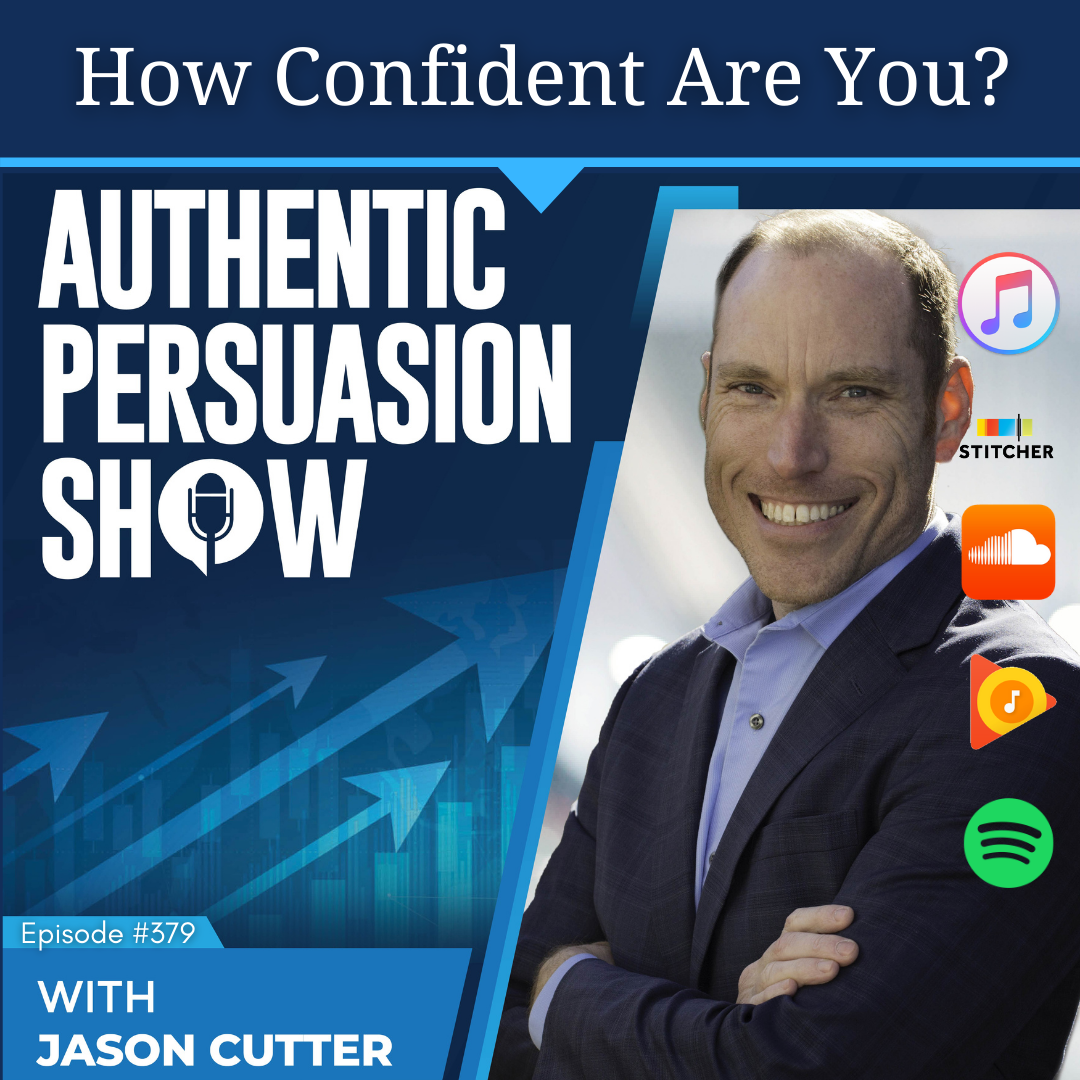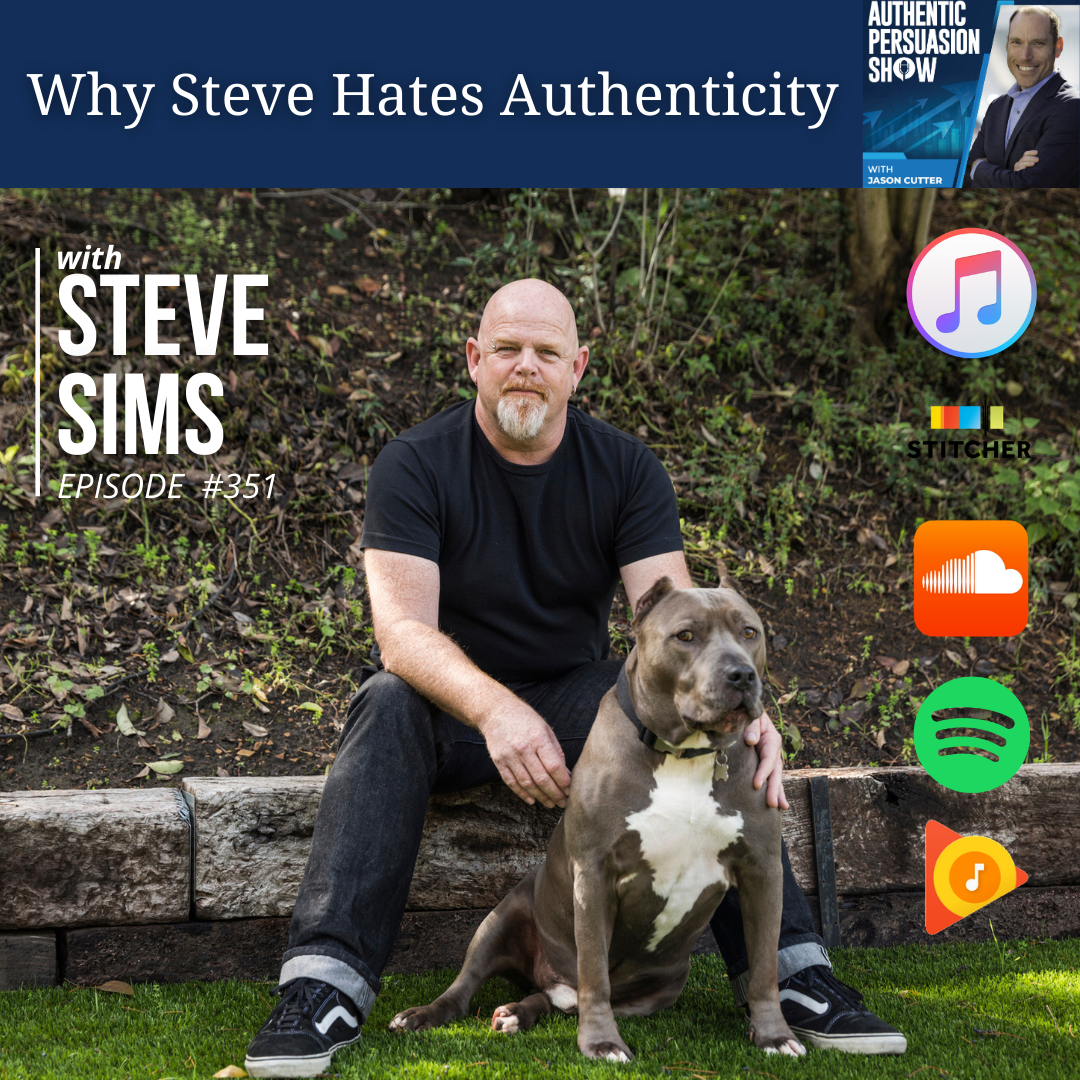Show Notes
“Why do I find myself talking so much during a sales call?”
Most reps I have worked with don’t ask this question.
Not because they don’t care, but because they aren’t aware.
Usually listening to some recordings of yourself will bring to light the amount of talking (usually, rambling, overtalking) that you are doing as a sales person.
So why does that happen?
In this episode I will share my experiences with why this happens.
Episode 88 – Transcript
What’s going on everybody, Jason Cutter here on this episode, I am going to answer a question that most sales reps don’t ask but should be welcome to the sales experience podcast.
So glad that you’re here listening to this. If you’re driving at the gym at work already, just getting up and starting your day, wherever it is, maybe it’s at the end of the day and you’re listening to these just as a kind of a recap, mental check in for sales related topics, whatever that might be for you.
So glad that you’re here. Please make sure to subscribe. If you want to keep getting these episodes, you can do that on iTunes, Stitcher, Spotify. It’s also on sound cloud.
It’s on the cutter consulting group.com website. You can find the full transcripts there and for now let’s get into the question. So the one that I see all the time that salespeople are not asking, but should be is why do I find myself talking so much during a sales call?
So again, sales call, it could be telephone call, it could be an in person presentation, could be a demo, whatever that might be. The reason why salespeople don’t ask this question enough is usually because of awareness.
They’re not aware of how much they’re talking and what that percentage of their talking relative to the prospect speaking looks like. Like what’s that number, what’s that percentage? And so most of them are unaware, but they should be asking this.
I think a lot of salespeople can feel it deep inside, but they think that’s just what you’re supposed to do. As a salesperson. You’re supposed to talk and talk and talk and you’re supposed to respond with long winded answers and you’re supposed to convince that person to buy by throwing a lot of stuff at them. And so why does this happen? Why do sales reps fall into this trap of talking too much?
Generally it comes into two different things. One is insecurity of the information that they’ve got. So they don’t think they know enough to give concise answers and they’ve just kind a got a ramble on and then go on and on and on.
Hopefully throwing enough stuff out there where the prospect both agrees with whatever the response was and overcomes the question that they had. Or the prospect gets so confused, they forgot what the question or objection or issue was and then the sales person can just continue.
Now that’s one thing. The other one is that salespeople talk too much. Sometimes when they have something to hide, when prospect asks a question where the salesperson knows that that’s kind of a deal killer or it’s an issue or it’s a common problem that a lot of people have or it’s something that could cause the deal to fall apart.
The salesperson will then go on and on and on, talk too much and just literally try to overcome that with sheer brute force and of course in both of those two situations, we don’t want those to happen.
If you’re a sales professional, if you’re a manager and owner, you’ve got a team you want to keep an ear out for when your sales reps are talking too much.
Fundamentally the best rule to look at depending on your situation, depending on if there’s a demo being done or if it’s just an intake, consultative sales presentation type of thing, you want to make sure that your salespeople are talking about a third the time and the prospect. The future customer should be talking two thirds of the time.
Now that’s a tough balance, but usually you get there by asking lots of questions and having the prospects speak and answer those questions and share about themselves, which will then uncover information that you can use in the sales process to see if it’s a good fit or not.
Now if you hear your wraps, if you’re a manager and if you your reps talking too much, make sure you identify which one it is.
Either they don’t have enough information and they’re just literally shooting from the hip and throwing crap at the wall hoping that something sticking. Or you can tell that they don’t believe in what they’re selling and they’re just throwing stuff out there to try to overwhelm the customer and get the deal done.
So in that case, you need to both do some education with your sales rep and help them understand the proper way to handle responses; more information about your product or service, or maybe it’s not a good fit because they just don’t fundamentally believe in it.
Now, there is another situation where people are talking too much during the sales call and not doing enough listening. They’re breaking that rule of talking a third and having the prospect talk to thirds, and that is usually when sales people like most people in the world are just not conscious of what they’re doing.
They’re on autopilot and they’re just talking too much. They might not even realize that. Most likely they don’t even realize it. If this is you, you might not even realize literally how much of the time you’re talking unless you were to listen to a recording of your sales presentation.
I’ve done this so many times with people where I’ve played them their recording, which of course remember everyone hates hearing their own voice, but literally I play it for them and they go, wow, I was talking too much.
That prospect asks a question. Salesperson responds for two, three, four minutes straight, just as giant monologue. And when that happens, you’ve got to understand that you have that control. You have that choice. Now it’s a hard one to do.
It’s possible that in your conversations in general, you talk a lot anyway in your personal conversations, family, friends, coworkers, people that you meet, you’re the one that’s generally talking.
If that’s the case, you’re going to struggle with sales because to be really effective in sales is not about over-talking an overwhelming the other person and dominating the conversation with lots of talking.
It’s about dominating the conversation with lots of questions and discovery and figuring out how you can solve the other person’s problems, which you can’t do when you’re the one who’s rambling on all the time.
So that’s why salespeople contend to talk too much. Again, it’s a lack of confidence. It’s a concern or worry about what the real information is and what might kill your deal, or just literally on autopilot and not paying attention.
So in the time that i have lefts today. Let’s talk about some solutions to this, which I’ve covered many times on the show, but it’s so important because I see this as one of the big fundamental challenges with salespeople and so what are the solution to this?
The first one is if you’re not confident about what you’re selling, learn more about it. Educate yourself, find out more information, do some industry research, whatever it is, whatever your product or service is, learn enough about it where you’re confident and strong in your answers.
Also, you have to have the confidence and understanding that when somebody asks you a question like price, that whatever the company has given you for the appropriate answer, whether it’s you know at that point in the sale, you don’t know what the price is so you don’t want to give a quote.
Are you, do you know what the prices and you have a range, whatever that is, make sure you just have that you believe in it and that you’re strong with it so that you can just give a short answer. All of your answers should be as short as possible.
That’s what a professional would do. That’s what somebody who’s enrolling and consulting and helping somebody buy, make a decision for themselves that would help them get to their goals, their dreams or hopes, overcome pain challenges, whatever it is that customer, whatever that prospect’s looking for.
You want to get to the point whenever they ask a question and if you don’t believe in what you’re selling, then obviously do more research and or leave the company that you’re at and go find something else to sell that you believe in more than you think it really does actually help people and impact them.
Now, if you’re on autopilot and you don’t know why or you don’t even realize it, then what you want to do is make sure he gets some coaching, some help, listen to your recordings, have your manager gets you calls. You can listen to that feedback.
Put a posted note on your screen, maybe set a timer. When you start talking where you know, then you want to limit it to a certain amount of time. When you’re giving your responses. Practice role play. It’s going to feel terrible if you’re normally that person who likes to talk and talk and talk.
It’s going to feel terrible inside to keep your answers short. But I promise if you’re in a sales role and your goal is to help people in through a consultative discovery based sales process, keeping your part short, asking questions, getting the other person to talk and not making it about you and your ego about you talking to express how smart you are, how many things you know or what you can relate to.
If you can cut that part out, you will be wildly successful in sales. That’s it for this episode.
Hopefully that helps. Again, make sure to subscribe. You can find it on linked in. You can find the show cutter consulting group and myself on LinkedIn. Send me a message. I love to hear from people. If you have questions, you want me to answer anything on the show, make sure to send that to me as well.
Always, remember that everything in life is sales and people remember the experience you gave them.
![[E88] Q&A Week: Why do I find myself talking so much during a sales call?](https://episodes.castos.com/salesexperiencepodcast/images/Authentic-Persuasion-Show-Cover-1400.png)


